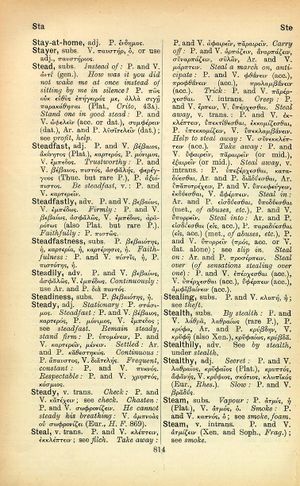steady: Difference between revisions
From LSJ
Νέος πεφυκὼς πολλὰ χρηστὰ μάνθανε → Dum floret aetas, disce, quod scitum decet → In jungem Alter lerne viel, was brauchbar ist
m (Woodhouse1 replacement) |
mNo edit summary |
||
| Line 11: | Line 11: | ||
[[settled]]: [[Aristophanes|Ar.]] and [[prose|P.]] [[καθεστηκώς]]. | [[settled]]: [[Aristophanes|Ar.]] and [[prose|P.]] [[καθεστηκώς]]. | ||
[[continuous]]: [[prose|P.]] [[ἄπαυστος]]. [[verse|V.]] [[ | [[continuous]]: [[prose|P.]] [[ἄπαυστος]]. [[verse|V.]] [[διατελής]]. | ||
[[frequent]], [[constant]]: [[prose|P.]] and [[verse|V.]] [[πυκνός]]. | [[frequent]], [[constant]]: [[prose|P.]] and [[verse|V.]] [[πυκνός]]. | ||
Revision as of 15:59, 4 June 2020
English > Greek (Woodhouse)
adjective
steadfast: P. and V. βέβαιος, καρτερός, P. μόνιμος, V. ἔμπεδος; see steadfast.
remain steady, stand firm: P. ὑπομένειν, P. and V. καρτερεῖν, μένειν.
settled: Ar. and P. καθεστηκώς.
continuous: P. ἄπαυστος. V. διατελής.
frequent, constant: P. and V. πυκνός.
respectable: P. and V. χρηστός, κόσμιος.
verb transitive
check: P. and V. κατέχειν; see check.
chasten: P. and V. σωφρονίζειν.
he cannot steady his breathing: V. ἀμπνοὰς οὐ σωφρονίζει (Eur., Hercules Furens 869).

